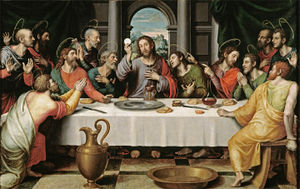Passover: Difference between revisions
No edit summary |
mNo edit summary |
||
| (One intermediate revision by one other user not shown) | |||
| Line 1: | Line 1: | ||
[[File:eucharist1.jpg|right|300px|thumb|The [[Passover]] was a symbol of the sharing that is required in a [[daily ministration]] of [[freewill offerings]] which was taught by [[John the Baptist]] and [[Christ]]. It was a reminder of the [[welfare]] system not based on [[force]]d offerings by [[benefactors]] who exercise authority like [[Nimrod]]. [[Pharaoh]], [[Caesar]], or [[ | [[File:eucharist1.jpg|right|300px|thumb|The [[Passover]] was a symbol of the sharing that is required in a [[daily ministration]] of [[freewill offerings]] which was taught by [[John the Baptist]] and [[Christ]]. It was a reminder of the [[welfare]] system not based on [[force]]d offerings by [[benefactors]] who exercise authority like [[Nimrod]]. [[Pharaoh]], [[Caesar]], [[Herod]], or [[FDR]] but the [[Daily bread]] of [[Charity]] essential for a free [[society]]. The [[Eucharist]] of [[Christ]] was not a crumb or wafer we see among [[modern Christians]] but the essential practice of [[Pure Religion]] through [[Communion]] and [[fellowship]] in daily [[love]] as explained by [[Justin the Martyr]] in his apology of Christianity to the [[Emperor]] of [[Rome]].]] | ||
Passover or Pesach is a major, biblically derived Jewish holiday. Jews celebrate Passover as a commemoration of their liberation by God from slavery in ancient [[Egypt]] and their freedom as a nation under the leadership of [[Moses]]. | Passover or Pesach is a major, biblically derived Jewish holiday. Jews celebrate Passover as a commemoration of their liberation by God from slavery in ancient [[Egypt]] and their freedom as a nation under the leadership of [[Moses]]. | ||
| Line 18: | Line 18: | ||
{{Template:Community}} | {{Template:Community}} | ||
[[Category:Articles]] | |||
[[Category:Definitions]] | |||
[[Category:Topics]] | |||
[[Category:Words]] | |||
Latest revision as of 10:36, 28 October 2023

Passover or Pesach is a major, biblically derived Jewish holiday. Jews celebrate Passover as a commemoration of their liberation by God from slavery in ancient Egypt and their freedom as a nation under the leadership of Moses.
The English term "Passover" is first known to be recorded in the English language in William Tyndale's translation of the Bible, later appearing in the King James Version as well. It is a literal translation of the Hebrew term.
Passover is a spring festival which during the existence of the Temple in Jerusalem was connected to the offering of the "first-fruits of the barley", barley being the first grain to ripen and to be harvested in the Land of Israel.
The Levites were also the first fruits. The firstborn of a family was to be the priest of that family or clan. The Levites were the firstborn of a nation and were to be priests to that nation while Israel was to be a priest to all nations.
The Passover ritual, prior to Deuteronomy, is widely thought to have its origins in an apotropaic rite, unrelated to the Exodus, to ensure the protection of a family home, a rite conducted wholly within a clan.
Even the Canaanite agricultural festival of spring was a ceremony of Unleavened Bread, connected with the barley harvest.
The biblical regulations for the observance of the festival require that all leavening be disposed of before the beginning of the 15th of Nisan but these symbols within the feasts and festivals like leaven are a metaphor for deeper meanings.
Jesus last supper was at the Passover meal and was practiced by early Christians along with the other feasts and festivals for centuries.
Community |
Intentional Community |
Sense of Community |
Community Types |
Community Ethics |
Community Law |
Voluntary society |
Voluntaryist Constitution |
Volunteer |
Society |
Individualism |
Liberalism |
Classical liberalism |
Transcendentalist |
Communities Ancient |
Communitarian |
Collectivism |
Identity politics |
Socialism |
Communism |
Primitive Communism |
Communion |
Eucharist |
Social Virtues |
Daily ministration |
Tens |
FEMA |
Burning Bush Festival |
Burning Bush Festival |
Feasts |
Feasts and festivals |
Pentecost |
Celebrate |
Law |
Rights |
Economy |
Education |
Welfare types |
Stimulus |
Building back |
The Greatest Reset |
Agorism |
Permaculture |
Guru theories |
Perfect law of liberty |
Benefactors |
Covetous practices |
Christian conflict |
Pure Religion |
Public religion |
Imperial Cult of Rome |
gods |
Covet |
First to do List |
Fundamental orders |
Network |